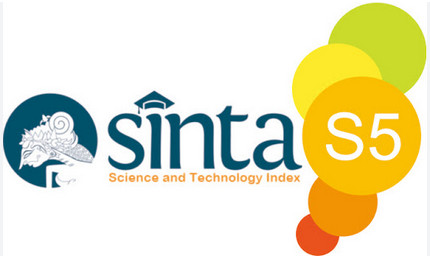Analisis Penerapan Pajak E-Commerce Sebagai Upaya Ekstensifikasi Pajak Guna Meningkatkan Pendapatan Negara
Abstract
ABSTRACT
This research was created with purpose to decipher more intensively about the study of e-commerce tax. The extension of tax scope in commercial sector including e-commerce was implemented for increasing revenue of the states. This study become important topic to discuss based on the fact of majority of people are inseparable from internet for doing daily activities including finished goods and services transaction. Because of that rapid development can be a chance to increase state revenue from tax imposition and management to that sector.
For methods which applied in this research will use qualitative and descriptive approach. Qualitative menas the researcher will observe the object that become the main focus of the research directly. After that the result of observation will be described in some sentences that already arranged in a such way for explaining and discuss the research object more clearly. Next for gathering the data, researchers use both of type data consist of primary and secondary data. For primary, researcher obtained by interviewing some source persons. Meanwhile for secondary data, researchers gather them from any kind of competent books. Then from the processing and explaining of gathered data will enter to the analyzing stage. This analyzing activty involve some aspects for example : calculating the estimation of tax quantity that can be obtained by state from e-commerce and study furthermore about any kind of facts from primary and secondary data for doing mix and match become whole explaination. From those systematics analysis, researchers able to get into conclusion.
In general, this research shows that tax imposition for e-commerce sector as an effort to increase state revenues can be held by 3 phases, they are : preparation phase, execution phase, and evaluation phase. Beside that for maintaining the management of e-commerce tax thus Directorate General of Taxation as the tax management authorized institution needs to w cooperate with the Center for Financial Transaction Reporting and Analysis (PPATK) and the Ministry of Communications and Information Technology.
Keywords: e-commerce, extensification tax state revenue
References
Apipah,D.2012.Kualitatif. http://www.diaryapipah.com/2012/05/pengertian-penelitian-kualitatif.html . Diakses pada tanggal 26 November 2016 pukul 11:26 WIB.
APJII, P. (2015). Asosiasi Penyelenggara Jasa Internet Indonesia. APJII. Jakarta.
Christover, A. P. (2016). Pemahaman ekstensifikasi wajib pajak dan intensifikasi pajak terhadap persepsi fiskus tentang penerimaan pajak. Jurnal EMBA: Jurnal Riset Ekonomi, Manajemen, Bisnis dan Akuntansi, 4(1).
Dalimunthe, Z. (2020). Tinjauan Yuridis Industri E-Commerce Dalam Menetapkan Pasar Yang Kompetitif Berdasarkan Undang-Undang Nomor 7 Tahun 2014 Tentang Perdagangan (Doctoral dissertation).
Dirjen Pajak. 2017. Visi Misi. http://www.pajak.go.id/visi_dan_misi. Diakses pada tanggal 17 Februari 2017.
Gunawan, C.I. (2022). Strategi pemasaran UMKM di era masyarakat ekonomi asean : teori dan prakte (edisi 3). CV IRDH: Malang.
Hallikainen, H., & Laukkanen, T. (2018). National culture and consumer trust in e-commerce. International Journal of Information Management, 38 (1), 97-106.
Isparmo. 2016. Data Statistik Pengguna Internet. http://isparmo.web.id/2016/11/21/data-statistik-pengguna-internet-indonesia-2016/. Diakses pada tanggal 16 Januari 2017
Jotopurnomo, C & Mangoting, Y. (2013). Pengaruh Kesadaran Wajib Pajak, Kualitas Pelayanan Fiskus, Sanksi Perpajakan, Lingkungan Wajib Pajak Berada Terhadap Kepatuhan Wajib Pajak Orang Pribadi di Surabaya. Tax & Accounting Review, 1(1), 49.
Kristanto, V. H. (2018). Metodologi Penelitian Pedoman Penulisan Karya Tulis Ilmiah:(KTI). Deepublish. Yogyakarta.
Kurnia, E. S., Kumadji, S., & Farah Azizah, D. (2015). Efektivitas Kegiatan Ekstensifikasi Perpajakan Dalam Upaya Meningkatkan Penerimaan Pajak Penghasilan Orang Pribadi di KPP Pratama Malang Selatan. Jurnal perpajakan.
Mardiasmo. 2009. Perpajakan.Edisi Ketiga Cetakan Kedelapan. Andi. Yogyakarta.
Novita, W., & Triadi, Y. (2022). Pengaruh E-Commerce Terhadap Peningkatan Pendapatan Usaha Mikro Kecil Dan Menengah Di Kota Padang. Jurnal Teknologi Dan Sistem Informasi Bisnis, 4(1), 152-161.
Purnama, N. I., & Putri, L. P. (2021, June). Analisis penggunaan E-commerce di masa pandemi. In Seminar Nasional Teknologi Edukasi Sosial dan Humaniora (Vol. 1, No. 1, pp. 556-561).
Rachmarwi, W., & ST, M. (2018). E-Commerce: Studi Tentang Belanja Online Di Indonesia. J. Manaj. Bisnis Krisnadwipayana, 6(2).
Ratnawati, J., & Hernawati, R. I. (2016). Dasar-Dasar Perpajakan. Deepublish. Yogyakarta.
Riphat, I. S. (2022). Pajak E-Commerce: Tantangan dan Upaya dalam Pajak E-Commerce. PT Elex Media Komputindo. Jakarta.
Sari, T. P., & Mitsalia, A. A. (2016). Pengaruh penggunaan gadget terhadap personal sosial anak usia pra sekolah di TKIT Al Mukmin. Profesi (Profesional Islam): Media Publikasi Penelitian, 13 (2).
Simbolon, H. A., & Siregar, V. M. M. (2018). Perancangan Sistem Informasi Berbasis E-Commerce Untuk Peningkatan Penjualan Produk Jersey Olah Raga. Jurnal Tekinkom (Teknik Informasi dan Komputer), 1 (2), 49-54.
Sudjiman, P. E., & Sudjiman, L. S. (2018). Analisis sistem informasi manajemen berbasis komputer dalam proses pengambilan keputusan. TeIKa, 8 (2), 55-66.
Sugiyono, 2008, Metode Penelitian Kuantitatif Kualitatif dan R&D. Alfabeta : Bandung.
Suprayitno, A., & Wahyudi, W. (2020). Pendidikan karakter di era milenial. Deepublish.
Tambun, S., & Witriyanto, E. (2016). Pengaruh Kesadaran Wajib Pajak Dan Penerapan E-System Terhadap Tingkat Kepatuhan Wajib Pajak Dengan Preferensi Resiko Sebagai Variabel Moderating (Studi Empiris Kepada Wajib Pajak Di Komplek Perumahan Sunter Agung Jakarta Utara). Media Akuntansi Perpajakan, 1(2), 86-94.
Vernia, D. M. (2017). Peranan Pendidikan dan Pelatihan Media Sosial dalam Pemasaran Online untuk Meningkatkan Daya Saing Usaha Mikro Kecil Menengah (UMKM). Lectura: Jurnal Pendidikan, 8(2).
Yulistia, Y. (2017). Analisis Pengaruh Efektivitas Dan Manfaat E-Commerce Terhadap Sikap Dan Perilaku Pengguna Dengan Menggunakan Metode TAM (Studi Kasus: UKM Kota Palembang). JATISI (Jurnal Teknik Informatika dan Sistem Informasi), 4 (1), 93-100.
Zellatifanny, C. M., & Mudjiyanto, B. (2018). Tipe penelitian deskripsi dalam ilmu komunikasi. Diakom: Jurnal Media Dan Komunikasi, 1 (2), 83-90.













